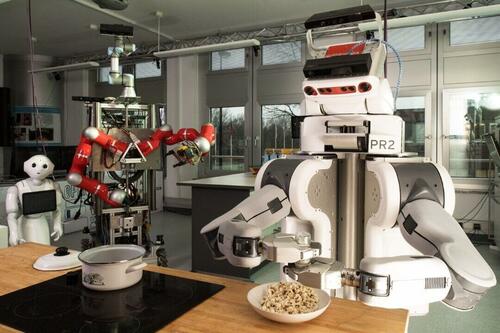
Do We Really Need Home Robots?
Authored by Jeffrey Tucker via The Epoch Times,
Maybe there was a time—when I was a kid watching “The Jetsons”—when I fantasized about a walking, talking, productive robot in my house. It would do the laundry, the cooking, the cleaning, answer the door, walk the dog, dress the kids, make the bed, and so on.

Many companies, most notably Tesla, are working on this now. We see the prototypes all over social media. Artificial intelligence (AI) language models have made their speech very impressive. Their movements are looking ever more natural. They do seem to be on the way, and Elon Musk says they will be the biggest consumer product in history.
These days, I’m not so sure. In fact, the prospect seems absurd to me, destined to make our lives worse not better. Do we really need fewer routines and more excuses to sit and stare at our computers while machines do even more work for us?
Count me among the skeptics. We have been replacing household routines with machines for a century. Some have merit because the manual way is too arduous. I would rather have a vacuum cleaner than beat out rugs, even if the latter method is better in the long run. Same with dishwashers and washing machines. I get that they save time.
But there comes a point when it is all too much. The trigger for me was the “smart” lightbulb. That’s where I drew the line. I would rather stand up and turn it off and on than become nothing but a couch potato with a smartphone. There are reasons perhaps for the ability to remotely manage household temperature, but if I were building today, I would look long and hard for analog over digital thermostats.
After my decision to reject smart bulbs, I started de-digitizing my domestic space. No more home assistants. I can stand up and turn the volume on the speaker up and down with my fingers. I can look through a hole in the door to see who is there. I can walk to the car and turn it on. And so on. I also appreciate not being surrounded by tools of surveillance.
As this process unfolded, I began to realize something culturally insidious about all of these new technologies. They all teach us to regret however it is we are using our time except and to the extent we are frittering away our lives on digital devices. They teach us that everything else we are doing is a waste of time.
We are encouraged always to get things done faster and with ever less effort. Whatever we are doing is regrettable. Adopting a new tech means saving time and energy. But ask yourself: For what are we actually saving this time and energy? Very likely it is something else that you are supposed to regret.
This becomes a major attitude problem. It creates a culture of grumbling and discontent. That attitude invades our hearts and souls, so eventually the normal stream of life itself becomes nothing other than a big pain in the neck. This then fuels the consumer demand for ever more products that promise to do everything for us.
How many actual skills are we losing along the way? Plenty.
Quick story about how I had wax melted all over a linen cloth. I had no idea what to do about it. So I looked it up on Grok. The suggestion came in two parts. First, freeze the cloth and scrape off the excess with a credit card. Second, iron it with a hot iron with a brown bag or newspaper between the iron and cloth.
I did it and was utterly astounded. It worked like a dream.
I thought, “Thank goodness for AI for teaching me this amazing trick.”
But in talking with others about it, it turns out that this is not some great secret. This is how people have been removing wax from cloth for centuries.
Apparently, our grandfathers all knew this. But for me, I somehow missed out on that lesson. Now it can be part of my routines.
One wonders how much other knowledge is being lost as we turn over more and more parts of our lives to AI and robots. There is a genuine danger here of intellectual and spiritual atrophy. We should think about this carefully before we plunge full-on into a machine-run world.
Every new technology brings benefits, but also costs. Musical skill is evaporating in the home, for example, and has for decades. Most young people today have no idea how to iron. When inflation hit restaurants so hard a few years ago, many people had to learn how to cook for the first time.
Most people have no clue about how clothing comes to be washed without a machine and would not even know how to begin cleaning a pair of socks by soaking them in hot water. Instead, we think the machines do some mysterious magic inside a rumbling box.
This is not a case against streaming music or washing machines but only a heads-up that they come at the cost of our own capacity to manage our lives in their absence. We become less useful as human beings. That surely must be recognized as something to regret, even if only a bit.
We should be more aware of the way the product market thrives off feeding our disgruntlement. It’s not evil, and that’s the market at work. There’s always going to be a better mousetrap.
But we should still be aware of the effect on our lives and attitudes. There is merit and joy in simple routines such as cleaning, cooking, folding, walking the dog, standing up from time to time and doing things, and even gardening and hard work.
If we come to think of all these things as pointless expenditures of time and energy, better done by a machine, a major swath of our lives becomes nothing but drudgery.
This is all about the attitude we bring to routine tasks. If we go into them with a sense that someone or something else should be doing them, we have a downcast mind, do a sloppy job, and let our brains be invaded by all kinds of negative energy.
If you look at the same task as an opportunity to be scrupulous, to be useful, to achieve something with one’s own hands, to better our little part of the world, and to take pride in what we have done, the opposite happens. Our blues turn to joy, gradually over time.
As I’ve written, this is how farmers think. They rise early to feed the chickens, repair the fences, fix the water well, brush the horses, or whatever else, not with a sense that all of this is terrible but rather that this is how life is, its very essence. It is all about using one’s own energy to exercise some controlling and civilizing cooperative relationship with the natural world around us.
Most of us are not farmers, but we can adopt the same patience, persistence, and joy that they have, even if we are dealing with urban commutes, buying groceries, or keeping our homes and spaces clean and orderly. Or gardening. We don’t need robots for this. We can do this with our own hands.
Again, what precisely are we preparing to do with the time we supposedly save with all this automation and rushing around? If you think about it, you are probably merely doing something else that you are regretting just as much as the previous thing. Honestly, this is no way to live.
It’s all about the attitude we bring to the conduct of daily life. If we listen to the constant screams that our lives are miserable—that it is darn near slavery to fold clothes and do dishes—so we need robots to do things for us, the result will be sadness all around instead of a constant sense of achievement.
Maybe there is a role for these machines for the sick and infirm, just like autonomous driving can be a dream for those in no position to drive themselves. But as usual with new products, we have a tendency to wildly exaggerate their merits, believing that they will take away all the demons that surround us. When that doesn’t work, we turn to substances.
Buy a robot if you must, but it is just as crucial to learn and do so-called menial tasks with joy, if only to remind ourselves of the high place of the human person—ourselves—in the unfolding of our lives. Maybe we should stop spending money on toys that encourage us to believe that we are ever less useful as human beings.
Every new technology in the 21st century seems to go in the same direction: overpromised results, wild enthusiasm, roaring stock markets, release, disappointment, and finally reality. Remember the way we were all going to wear headsets and live in the Metaverse? That did not happen.
Similarly on robots for domestic use. I’m bearish. My intuition is that society has already seen peak techno-utopia and is now ready for a return to the physical world with all its beautiful routines, the mastery of which requires human hands.
Views expressed in this article are opinions of the author and do not necessarily reflect the views of The Epoch Times or ZeroHedge.
Tyler Durden
Fri, 06/06/2025 – 07:20

















